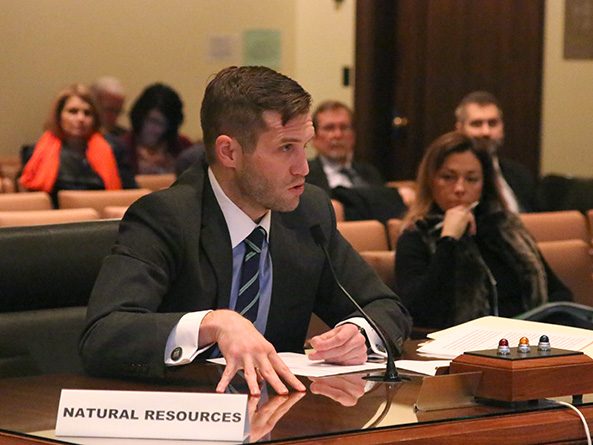Shared solar energy programs considered
The Natural Resources Committee heard testimony Feb. 9 on a bill that is intended to promote the development of solar energy generating projects in Nebraska.
Sponsored by O’Neill Sen. Tyson Larson, LB626 would require local power utilities to work with groups of customers interested in building a shared community solar energy generating system. At the request of customers, the utility would adopt regulations to establish the pilot project and oversee connection of the system to the state’s electric grid. Customer-generators would receive credits based on their portion of the project’s energy production.
“Although there has been a great deal of interest in solar energy development in Nebraska,” Larson said, “very little exits today when compared with other states.”
He said 15 states and Washington, D.C., have authorized shared renewable energy projects. Shared programs allow customers to pool their resources when building an energy-generating system, making it cheaper for everyone involved, Larson said.
The bill also would allow customer-generators to contract with a third party to finance, build or operate a system.
Cliff Mesner, of Mesner Solar Development, testified in support of the bill. He said his company has completed successful community solar projects in Central City, Holdrege, Venango and Scottsbluff. One benefit of shared solar programs, aside from cost savings provided by economies of scale, is that they allow communities to site solar arrays in a single place, such as an abandoned parking lot or a field on the outskirts of town, he said.
Mesner said LB626 is necessary because those who want to build shared projects need their local utility’s cooperation.
“If the utility companies want to work with you, you can do it,” he said. “If the utility companies don’t work with you, you have a problem.”
Nancy Meyer of Cedar Bluffs also testified in support of the bill, saying that the development of solar energy would give Nebraska utilities greater energy independence. The financial viability of the state’s utilities relies on the price of coal and demand from states where the utilities sell excess electricity, she said.
“Thus it makes sense that increased ability to generate power within the state using our own abundant natural resources will help utilities and all Nebraskans achieve greater autonomy and control of their energy destiny,” Meyer said.
Kristen Gottschalk, speaking on behalf of the Nebraska Rural Electric Association, testified in opposition to the bill. She said authorizing customers to contract with a third party to build shared solar energy generating systems does not give utilities enough control over electricity prices or how the systems are engineered and connected to distribution infrastructure. Ultimately, Gottschalk said, the bill is not necessary to authorize community solar projects.
“Community solar and solar projects are burgeoning across the state,” she said, “and we’re going to continue to see that happen.”
The committee took no immediate action on the bill.


